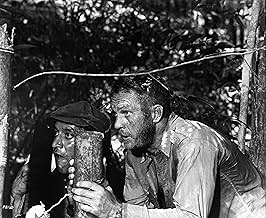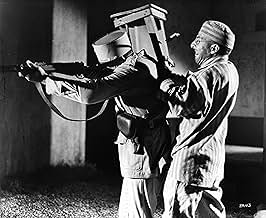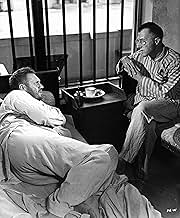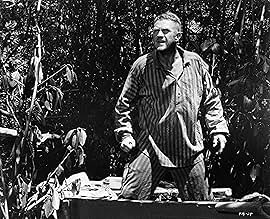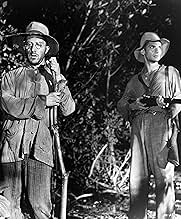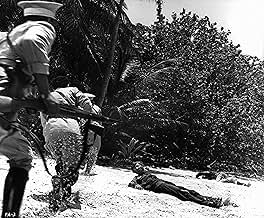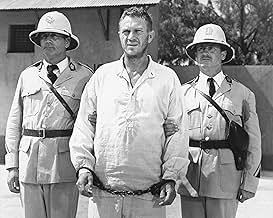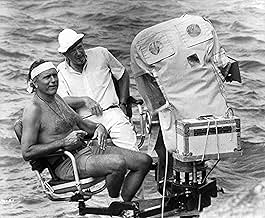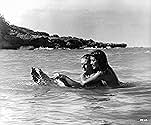A French convict in the 1930s befriends a fellow criminal as the two of them begin serving their sentence in the South American penal colony on Devil's Island, which inspires the man to plot... Read allA French convict in the 1930s befriends a fellow criminal as the two of them begin serving their sentence in the South American penal colony on Devil's Island, which inspires the man to plot his escape.A French convict in the 1930s befriends a fellow criminal as the two of them begin serving their sentence in the South American penal colony on Devil's Island, which inspires the man to plot his escape.
- Nominated for 1 Oscar
- 2 wins & 2 nominations total
Vic Tayback
- Sergeant
- (as Victor Tayback)
8.0144.4K
1
2
3
4
5
6
7
8
9
10
Featured reviews
Enjoyable film upon escapes from an impregnable prison with strong performances
The movie centers an unrelenting prisoner (terrific Steve MacQueen , who once exposed : this shooting was one of the most exhilarating experiences of my life) is sent to French Guayana in Devil's Island . He is determined to break out from the gaol placed on a deserted and impenetrable island . He befriends an inmate (Dustin Hoffman , a real chameleon actor who here had to wear contact lenses) who's imprisoned for swindle . They will confront lot of dangers and sufferings until reach freedom . McQueen tries a series of escapes but he's always recaptured . The punishments will be terrible and developed in graphic realism .
The story is based on real deeds , it is adapted from an autobiographical best-selling book about a French burglar named Henri Charriere and Dalton Trumbo (previously blacklisted in the famous Black List and he's cast as the Commandant) and Lorenzo Semple Jr. Are the splendid screenwriters . The pic is overlong , about two hours and half , though is neither boring , nor tiring , but entertaining , because of it develops several adventures and happenings . The motion picture had a big success , it was a box office winner . It achieved hits at every cinemas around the world . The film is a magnificent portrayal of tortures and sufferings of the prisoners in far countries . The yarn's title refers to the starring's butterfly tattoo , being based on his actual-life , as Papillon , Henri Charrière , he was 25 when he was sent to French Guyana .
Interpretation protagonists -McQueen, Hoffman- is top notch , they make a magnificent couple . In fact , McQueen did his own stunts , as he even insisted on performing a dangerous leap , as he jumped off a cliff himself . Dustin Hoffman said his interpretation was based on the movie's screenwriter Dalton Trumbo , especially his withdrawn and shy mannerisms which had inspired him when meeting Trumbo for the first time . The support cast , though very secondary , is very fine : George Coulouris , Don Gordon , Gregory Sierra , Victor Jory , among others . The veteran Jerry Goldsmith creates an exciting and atmospheric musical score , he also composed soundtracks for other Schaffner films as ¨Planet of Apes¨ and ¨Boys from Brazil¨ . Fred Koenekamp cinematography is excellent with astounding outdoors of the jungle . The picture was compellingly directed by Franklin J. Schaffner (¨Planet of Apes¨ , ¨Patton¨) . The flick will appeal to prison genre buffs and adventures films fans . Rating : Good and nice . Better than average . Well worth seeing.
The story is based on real deeds , it is adapted from an autobiographical best-selling book about a French burglar named Henri Charriere and Dalton Trumbo (previously blacklisted in the famous Black List and he's cast as the Commandant) and Lorenzo Semple Jr. Are the splendid screenwriters . The pic is overlong , about two hours and half , though is neither boring , nor tiring , but entertaining , because of it develops several adventures and happenings . The motion picture had a big success , it was a box office winner . It achieved hits at every cinemas around the world . The film is a magnificent portrayal of tortures and sufferings of the prisoners in far countries . The yarn's title refers to the starring's butterfly tattoo , being based on his actual-life , as Papillon , Henri Charrière , he was 25 when he was sent to French Guyana .
Interpretation protagonists -McQueen, Hoffman- is top notch , they make a magnificent couple . In fact , McQueen did his own stunts , as he even insisted on performing a dangerous leap , as he jumped off a cliff himself . Dustin Hoffman said his interpretation was based on the movie's screenwriter Dalton Trumbo , especially his withdrawn and shy mannerisms which had inspired him when meeting Trumbo for the first time . The support cast , though very secondary , is very fine : George Coulouris , Don Gordon , Gregory Sierra , Victor Jory , among others . The veteran Jerry Goldsmith creates an exciting and atmospheric musical score , he also composed soundtracks for other Schaffner films as ¨Planet of Apes¨ and ¨Boys from Brazil¨ . Fred Koenekamp cinematography is excellent with astounding outdoors of the jungle . The picture was compellingly directed by Franklin J. Schaffner (¨Planet of Apes¨ , ¨Patton¨) . The flick will appeal to prison genre buffs and adventures films fans . Rating : Good and nice . Better than average . Well worth seeing.
A Fine Film Which Does The Book Justice
Usually, after reading a long book filled with many interesting adventures, watching a two-hour film later winds up being a big disappointment. There is no way a film can give you anywhere near the info you glean from a book, especially one over 500 pages as is the case with "Papillion." Yet, despite most of Henri Charriere's incredible feats of survival, ("Papillion" was Charriere's nickname) this movie is above average and basically does the book justice. The movie runs about two-and-a-half hours and gives enough of a flavor to have the viewer appreciate - at least to some degree - the brutal trials and tribulations Papillion went through in real life.
If you enjoyed this film, the book is a "must-read" for you and very highly-recommend You won't believe all the things Charriere experienced: good and bad. In real life, the man escaped something like eight times and each time went through hell.
Steve McQueen, playing "Papillion," was excellent. He was particularly good at showing the physical effects of years of solitary confinement. By the way, in real life, Charriere was much younger went sent to jail than McQueen was at the time this movie was shot. Papillion should have been played by a younger actor, but who's going to complain when you get an actor of McQueen's caliber?
Dustin Hoffman also was great as Papillion's friend, "Louis Dega," who had a bigger role in the movie than he did in the book. For the most part, Papillion had a number of friends, all helping him over the years. Hoffman also provided some good comic relief to the movie and, heaven knows, it needed it. Take it from someone who has read the book: this is a grim story, worse than what you saw on screen here.
Nevertheless, thanks to the two leading actors and the wonderful work by Director Franklin Schaffner and Cinematograher Fred Koenekamp, this long film entertained. No, it wasn't the caliber of the book, but it's didn't insult it, either, and is definitely worth a look.
If you enjoyed this film, the book is a "must-read" for you and very highly-recommend You won't believe all the things Charriere experienced: good and bad. In real life, the man escaped something like eight times and each time went through hell.
Steve McQueen, playing "Papillion," was excellent. He was particularly good at showing the physical effects of years of solitary confinement. By the way, in real life, Charriere was much younger went sent to jail than McQueen was at the time this movie was shot. Papillion should have been played by a younger actor, but who's going to complain when you get an actor of McQueen's caliber?
Dustin Hoffman also was great as Papillion's friend, "Louis Dega," who had a bigger role in the movie than he did in the book. For the most part, Papillion had a number of friends, all helping him over the years. Hoffman also provided some good comic relief to the movie and, heaven knows, it needed it. Take it from someone who has read the book: this is a grim story, worse than what you saw on screen here.
Nevertheless, thanks to the two leading actors and the wonderful work by Director Franklin Schaffner and Cinematograher Fred Koenekamp, this long film entertained. No, it wasn't the caliber of the book, but it's didn't insult it, either, and is definitely worth a look.
An amazing true story gets a pretty good film treatment.
The true story of Henri Charriere (nicknamed "Papillon" because of his butterfly tattooed chest), a Frenchman falsely accused of murder and sent to French Guiana's inescapable penal colony. Charriere spent years trying to escape from this mosquito-ridden, malaria-prone hellhole, but every attempt somehow went awry. On many occasions, the recaptured Charriere was sent into solitary confinement and only survived thanks to his incredible mental strength. Ultimately, the authorities lost hope of taming his urge to break out, so they abandoned him on Devil's Island, a tiny land mass where guards were not needed since the constantly ferocious surrounding sea was ample deterent for any would-be escapees.
Franklin J. Schaffner directs this film quite well, capturing the appalling prison conditions vividly and getting a wonderful, multi-layered performance from Dustin Hoffman as Charriere's friend, convict Louis Dega. However, McQueen struggles with the demands of the lead role. Yes, he's physically accurate in the part and during the escape sequences he looks convincing. However, during the quieter moments, McQueen looks distinctly uncomfortable, and his natural "cool" persona doesn't equate with the humiliated, tormented character he is supposed to be playing. The subsidiary characters are great, especially the guy with the tattooed face who attributes his ugly tattoos to an evening of drunkeness, and Anthony Zerbe as a grossly disfigured leper who asks Papillon to share a cigar with him.
Best sequence? Probably the one where McQueen and another escapee flee through the rainforest from some soldiers, using natural jungle-based narcotics to preserve their energy levels.
Franklin J. Schaffner directs this film quite well, capturing the appalling prison conditions vividly and getting a wonderful, multi-layered performance from Dustin Hoffman as Charriere's friend, convict Louis Dega. However, McQueen struggles with the demands of the lead role. Yes, he's physically accurate in the part and during the escape sequences he looks convincing. However, during the quieter moments, McQueen looks distinctly uncomfortable, and his natural "cool" persona doesn't equate with the humiliated, tormented character he is supposed to be playing. The subsidiary characters are great, especially the guy with the tattooed face who attributes his ugly tattoos to an evening of drunkeness, and Anthony Zerbe as a grossly disfigured leper who asks Papillon to share a cigar with him.
Best sequence? Probably the one where McQueen and another escapee flee through the rainforest from some soldiers, using natural jungle-based narcotics to preserve their energy levels.
Unforgettable, fantastic film, one of my top personal favorites
Papillon is one of my all-time favorites films. Steve McQueen is fantastic in the lead role. Dustin Hoffman is at his finest as Louie Dega. Very memorable, unforgettable performances, shocking action scenes and psychological thrills and twists. I cannot write enough good things about this film. After years of looking, I recently found this film on DVD and added it to my collection. This is the kind of movie that you can watch again and again and continue to see things you've never noticed before. This film never gets old and you never grow tired of watching Papillon. Some of the cast includes Vic Tayback also known as Mel from the hit TV series "Alice." He is convincing as a mean, surly prison guard. Also, Billy Tumy known for his role in "Lost in Space" as Will Robinson, plays a young, doomed inmate. There are other character actors included in the cast that you will more than likely recognize throughout the film. I give this film the strongest and highest of recommendations.
Butterfly Man Of Devil's Island
Watching Papillon today it occurred to me that the film it most resembles is Birdman of Alcatraz. Both Steve McQueen and Burt Lancaster were sent to prison for murder convictions although allegedly McQueen was innocent. Both were based on true characters who wrote, in the case of Lancaster ghost wrote, their own memoirs of their time in the joint and the films are based on those books. And certainly both men were rebel spirits.
In Lancaster's case it's an internal rebellion against the rules of the penal system. Of course in the work he did developing those bird remedies, he rehabilitated himself in a way that 'the system' did not understand.
But in the case of Henri Charriere aka Papillon for the butterfly tattoo on his chest, he just wants out of the penal colony at Devil's Island and makes many attempts to get shed of the place. The film is about his many attempts and his refusal to quit no matter what is done to break him. Devil's Island in the Thirties was not any better than it was when Alfred Dreyfus was doing his time in the tropical prison. Still McQueen is resourceful enough as you will see.
McQueen though he's far from French has the rebel persona that really fits this part. Had he been younger and this been a French production I could have seen Jean Gabin in the role. It's one of McQueen's best roles and he holds your interest throughout this nearly three hour film.
Leading an impressive supporting cast is Dustin Hoffman who plays what we would now call a white collar criminal. He becomes a devoted acolyte of McQueen seeing he's going to need friends himself if he's to survive Devil's Island. He also wants to escape in the worst possible way.
Later on we see Hoffman in a different light as if completing the Birdman of Alcatraz analogy, Hoffman's role is similar to that of Telly Savalas who's a tough character when we first meet him in Birdman, but later becomes acclimated to prison life. Hoffman has worked himself into a nice situation relatively speaking on the Island and has resigned himself that this is his home for better or worse. It's a very good performance by Hoffman as his character changes during the film.
I'd really recommend seeing both Birdman of Alcatraz and Papillon back to back. It's a good prison doubleheader for a rainy afternoon.
In Lancaster's case it's an internal rebellion against the rules of the penal system. Of course in the work he did developing those bird remedies, he rehabilitated himself in a way that 'the system' did not understand.
But in the case of Henri Charriere aka Papillon for the butterfly tattoo on his chest, he just wants out of the penal colony at Devil's Island and makes many attempts to get shed of the place. The film is about his many attempts and his refusal to quit no matter what is done to break him. Devil's Island in the Thirties was not any better than it was when Alfred Dreyfus was doing his time in the tropical prison. Still McQueen is resourceful enough as you will see.
McQueen though he's far from French has the rebel persona that really fits this part. Had he been younger and this been a French production I could have seen Jean Gabin in the role. It's one of McQueen's best roles and he holds your interest throughout this nearly three hour film.
Leading an impressive supporting cast is Dustin Hoffman who plays what we would now call a white collar criminal. He becomes a devoted acolyte of McQueen seeing he's going to need friends himself if he's to survive Devil's Island. He also wants to escape in the worst possible way.
Later on we see Hoffman in a different light as if completing the Birdman of Alcatraz analogy, Hoffman's role is similar to that of Telly Savalas who's a tough character when we first meet him in Birdman, but later becomes acclimated to prison life. Hoffman has worked himself into a nice situation relatively speaking on the Island and has resigned himself that this is his home for better or worse. It's a very good performance by Hoffman as his character changes during the film.
I'd really recommend seeing both Birdman of Alcatraz and Papillon back to back. It's a good prison doubleheader for a rainy afternoon.
Did you know
- TriviaSteve McQueen insisted on performing the stunt where he jumps off a cliff into the water. McQueen once said that it was "one of the most exhilarating experiences of my life".
- GoofsIt is highly implausible (and never explained) why the escaped trio would need to sail their boat all the way to Honduras, a country in Central America and several thousand miles away from French-Guiana. Why not sail along the coast due south to Brazil or north-west to Venezuela? In fact, in the autobiographic novel on which the movie is loosely based, Papillon (Henri Charriere) eventually escapes to Venezuela.
- Alternate versionsSome American prints of this film run 132 minutes, instead of 150.
- ConnectionsFeatured in The Ultimate Stuntman: A Tribute to Dar Robinson (1987)
- How long is Papillon?Powered by Alexa
Details
- Release date
- Countries of origin
- Languages
- Also known as
- Papillón
- Filming locations
- St Laurent du Maroni, Guyane, Départements d'Outre-Mer, France(Camp de la Transportation, closing sequence)
- Production companies
- See more company credits at IMDbPro
Box office
- Budget
- $12,000,000 (estimated)
- Gross US & Canada
- $53,267,000
- Gross worldwide
- $53,267,000
- Runtime
- 2h 31m(151 min)
- Color
- Sound mix
- Aspect ratio
- 2.35 : 1
Contribute to this page
Suggest an edit or add missing content


